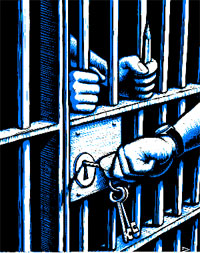 Before coming to Sojourners to serve as the congregational coordinator, I had the unique opportunity to teach Protestant faith formation classes at Leavenworth federal prison in Kansas. Leavenworth was experimenting with a program called Life Connections that allowed Muslims, Christians, and adherents of a variety of faith traditions the opportunity to live together in community and participate in spiritual formation. Participants had the opportunity to deepen their own faith and, at the same time, build trust and friendships with people from other faiths.
Before coming to Sojourners to serve as the congregational coordinator, I had the unique opportunity to teach Protestant faith formation classes at Leavenworth federal prison in Kansas. Leavenworth was experimenting with a program called Life Connections that allowed Muslims, Christians, and adherents of a variety of faith traditions the opportunity to live together in community and participate in spiritual formation. Participants had the opportunity to deepen their own faith and, at the same time, build trust and friendships with people from other faiths.
I will never forget arriving at the “Big House” for the first time. I approached the ominous guard tower, announced myself, and ascended the long staircase toward the prison entrance. There is something unsettling about the first time you hear the door click behind you. Yet the biggest surprise was not the unsettling confinement, but the students I was about to meet. I had great plans for imparting my superior knowledge of Christian faith and its life implications to the program participants. But when I arrived, I realized that the awaiting class would not only be students, but they would be fellow dialogue partners on the Christian journey. In particular, I was impressed by their knowledge of church history, theology, and the ability of one student to quote Thomas à Kempis.
The participants, who would soon become friends, had amassed an incredible knowledge of the Christian faith and its history from an extensive religious library in the prison. I was a little jealous of their selection. That’s why I am outraged this week to read the following in The New York Times:
Behind the walls of federal prisons nationwide, chaplains have been quietly carrying out a systematic purge of religious books and materials that were once available to prisoners in chapel libraries.
The Bureau of Prisons has created a list of acceptable religious books from various faiths and excluded all others. In the name of cleansing the library of radical beliefs, some of the greatest Christian authors have been removed. Who are some of the purged authors? Karl Barth, Reinhold Niebuhr, and Cardinal Avery Dulles, just to name a few. Additionally, the Bureau of Prisons has refused to pay for re-stocking the libraries after the purge, leaving many religious libraries near empty.
In our world and especially in a prison system, where religious faith often seems to divide, my friends in Life Connections, assisted by their extensive religious library, deepened not only their faith but had a profound and positive impact upon Leavenworth federal prison. The purging of religious books from a federal institution hampers not only the discipleship of prisoners, but it should cause us to pause and ask ourselves how this happened in the name of freedom and safety.
Kevin Lum is the congregational network coordinator for Sojourners/Call to Renewal.

